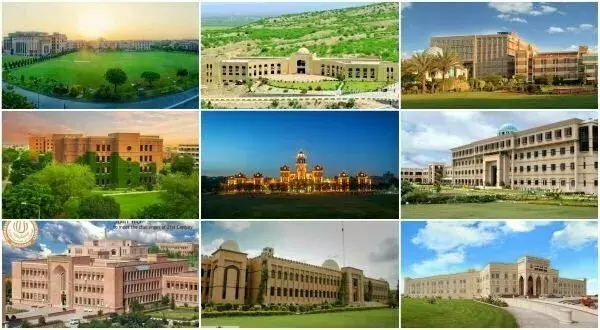Education in Pakistan: An Overview and Top Universities

Education is overall a powerful and major tool for personal and societal development. It not only improves the individual knowledge and skills but also main source of economic growth, overcome poverty, and fosters social cohesion.
In today’s more advance globalized world, education is no doubt more important than ever, as it helps prepare individuals to face and compete in a rapidly evolving job market and contribute to their communities.
The Current State of Education in Pakistan
Literacy Rates
Even though Pakistan has made significant progress in education system, but still challenges remain. According to latest UNESCO survey reports, the overall literacy rate in Pakistan was 59.1% in 2021. Though it shows some improvement compare to previous years, it still stands behind the global literacy rate of average of 86.3%.
Government Initiatives and Policies
The Pakistani government has implemented several initiatives aimed at improving the education sector, such as the National Education Policy and Vision 2025. These policies mainly focus on enhancing the quality of education in Pakistan, increasing enrollment, and reducing gender disparities as well in access to schooling.
Challenges Faced by the Education Sector
Despite these efforts, Pakistan’s education sector faces numerous challenges. These include inadequate funding, a lack of qualified teachers, outdated curricula, and insufficient infrastructure. Additionally, social factors such as poverty, gender discrimination, and regional disparities exacerbate these issues.
For more information, visit Higher Education Commission in Pakistan.
Top Universities in Pakistan
National University of Sciences and Technology (NUST)
NUST is a leading institution in Pakistan, renowned for its programs in engineering, information technology, and natural sciences. Located in capital of Pakistan Islamabad, top ranking university was established in 1991, and gain the strong reputation for research and innovation, attracting top talent from country and around the world.

Quaid-i-Azam University
Quaid-i-Azam University is also one of the best prestigious institution offering a wide range of disciplines, such as social sciences, natural sciences, and humanities as well. Located in Islamabad, university was established in 1967. It named after founder of Pakistan, Muhammad Ali Jinnah, and also has a strong records in research and academic excellence.

University of Agriculture, Faisalabad
The University of Agriculture Faisalabad, is one of the oldest and most respected educational institutions in Pakistan founded in 1906. It mainly specializes in agricultural sciences, veterinary sciences and contributing significantly to the country’s development in agriculture sector.

COMSATS Institute of Information Technology
Established in 1998, COMSATS Institute of Information Technology is a leading institution in IT sector and computer sciences. With multiple campuses in many cities of Pakistan, COMSATS focuses on providing quality education and fostering research and development in latest cutting-edge technologies.

Karachi University
Located in the Sindh’s provincial capital Karachi and founded in 1951, Karachi University is one of the largest and oldest universities in Pakistan. The university offers a vast range of programs in sciences, art and humanities. With a major focus on research and innovation, Karachi University has produced many notable alumni with significant contributions in country’s development.

Criteria for Ranking Universities
When evaluating the best universities in Pakistan, several factors come into play. Some of the most important criteria include:
Academic Reputation
A university’s academic reputation is mainly depending on the quality of its faculty, teaching, and research output. Top universities attract renowned scholars and researchers, contributing to the institution’s overall prestige.
Employer Reputation
Employer reputation is a crucial factor in determining a university’s standing. Graduates from institutions with strong employer reputations are more likely to find employment quickly and enjoy successful careers.
Research Output
Universities that prioritize research and innovation often rank higher than their counterparts. High-quality research output not only enhances a university’s academic reputation but also contributes to societal development.
Internationalization
Top universities often have a global outlook, attracting students and faculty from around the world. Internationalization can improve a university’s reputation, enrich the learning experience, and open up opportunities for collaboration and exchange.
Tips for Choosing the Right University
When selecting the best university for your needs, consider the following factors:
- Program offerings: Ensure the university offers the specific program or major you’re interested in pursuing.
- Reputation: Research the institution’s reputation in your chosen field, as this can impact your future career prospects.
- Location: Consider the university’s location and whether you’re comfortable living in that area for an extended period.
- Financial support: Investigate scholarship opportunities and financial aid programs offered by the institution.
- Campus life: Visit the campus and speak with current students to gain insight into the university’s culture and environment.
Conclusion
Education in Pakistan has seen significant progress over the years, but numerous challenges persist. The country boasts several prestigious universities, each with its strengths and areas of expertise. When you’re looking for best university, it’s important to consider main factors such as academic reputation, employer reputation, and research output as well. By selecting the right institution, students can pave the way for a successful and fulfilling career.
FAQs
- What is the literacy rate in Pakistan? The adult literacy rate in Pakistan was 59.1% in 2021, according to UNESCO.
- What are some top universities in Pakistan? Some best and known universities in Pakistan include the National University of Sciences and Technology (NUST), Quaid-i-Azam University, University of Agriculture, Faisalabad, COMSATS Institute of Information Technology, and Karachi University.
- What are the main challenges faced by Pakistan’s education sector? The main challenges include inadequate funding, a lack of qualified teachers, outdated curricula, insufficient infrastructure, and social factors like poverty and gender discrimination.
- What factors should I consider when choosing a university in Pakistan? Consider factors such as program offerings, reputation, location, financial support, and campus life when selecting a university.
- How important is internationalization for Pakistani universities? Internationalization can improve a university’s reputation, enrich the learning experience, and open up opportunities for collaboration and exchange, making it an essential factor for top institutions.
Also Read: How to Apply for CNIC in Pakistan? Step by Step Guide
